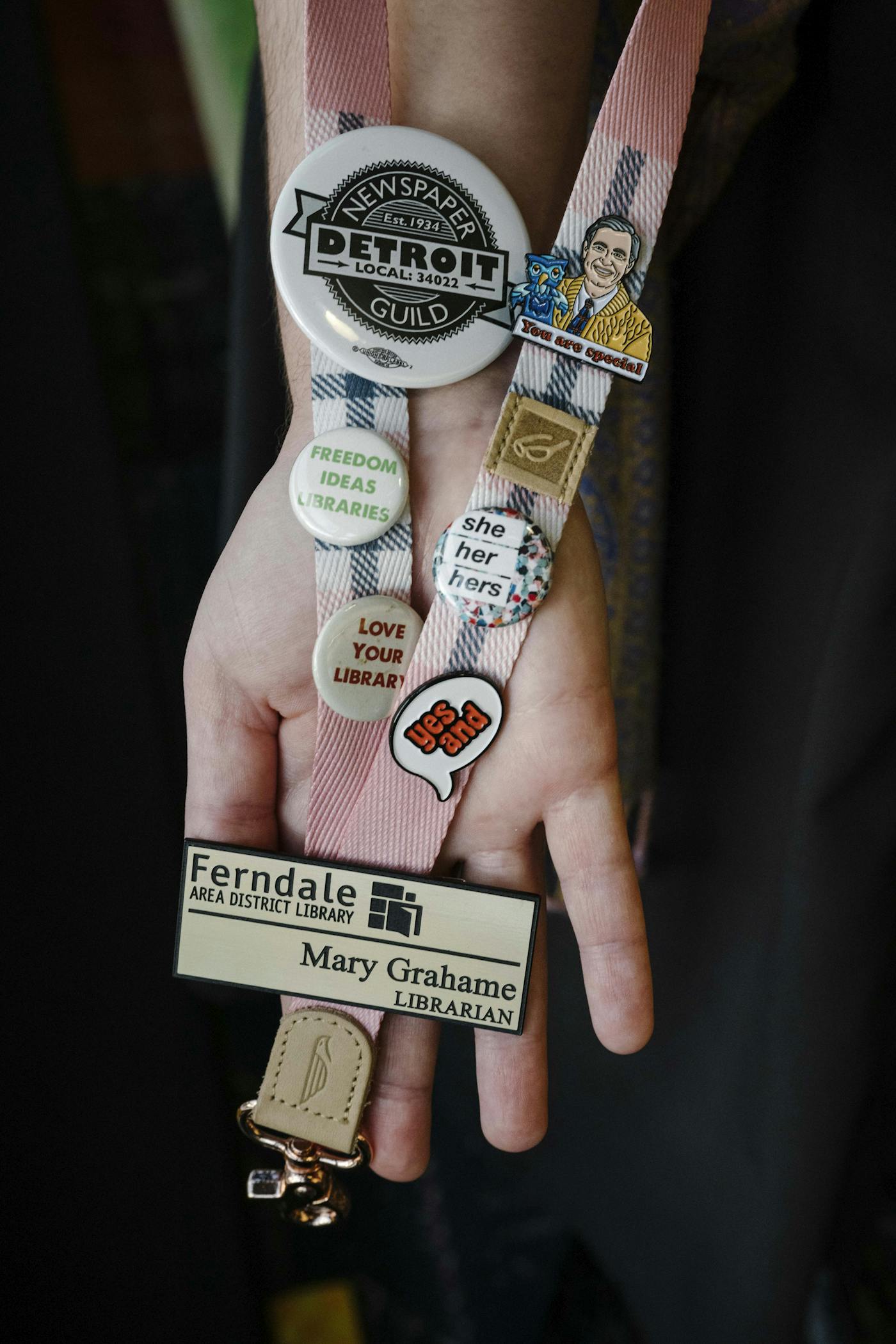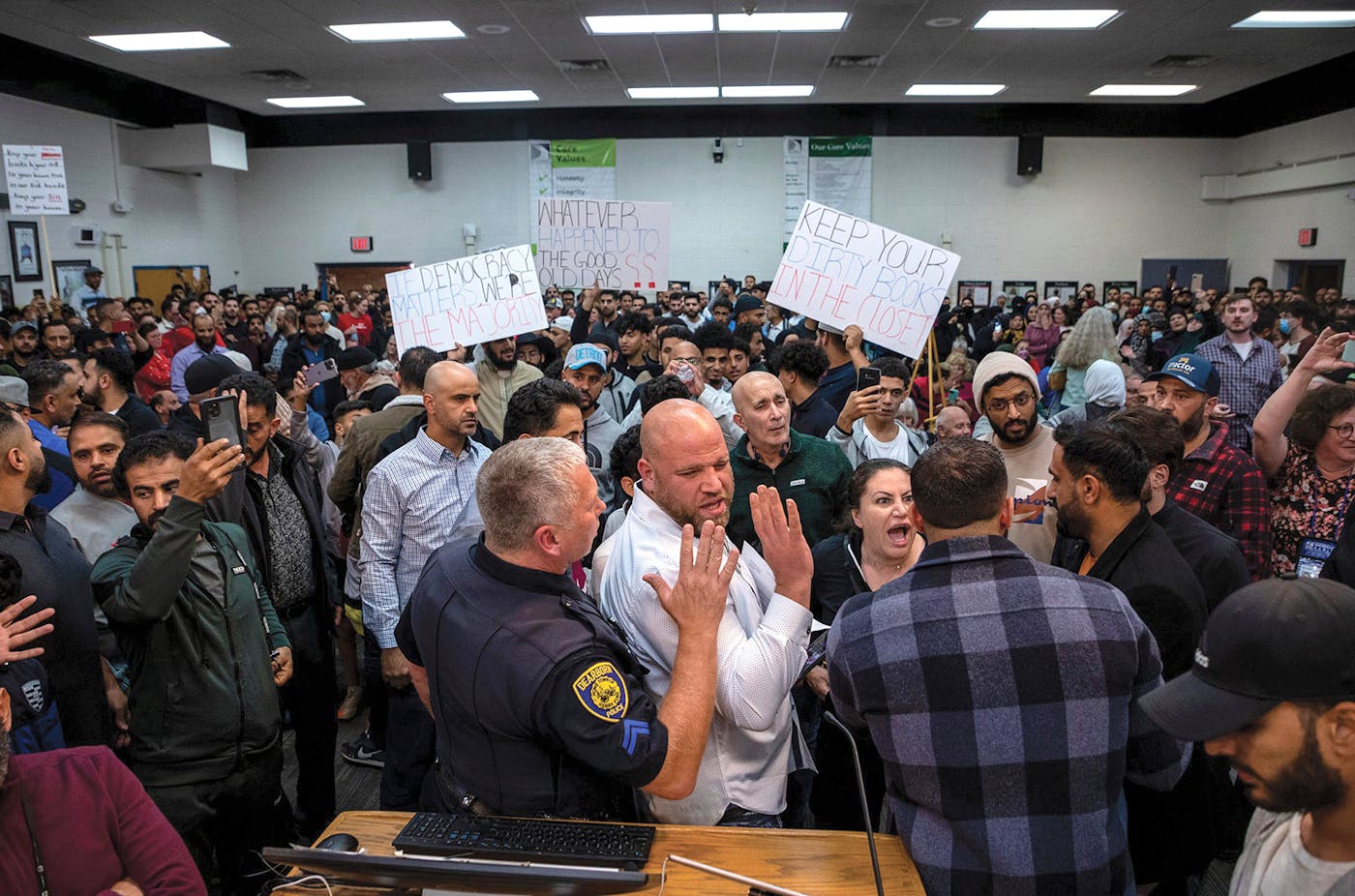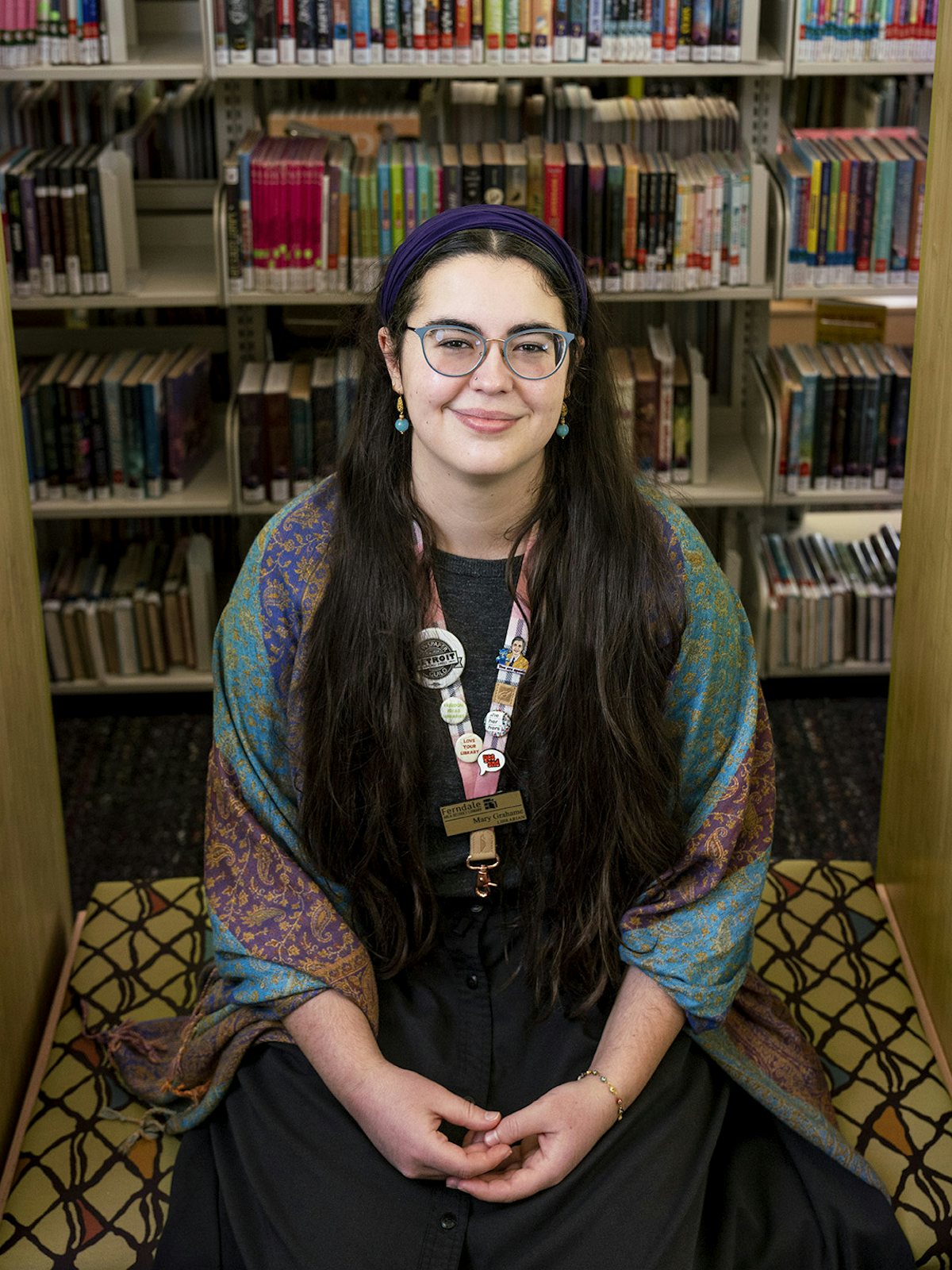It was Martin Luther King Jr. Day, and the children were off from school in the Ferndale Area District Library in Michigan, zooming around the play area in the Kid’s Corner, where no one needs to be totally hushed, and where the youth desk toward the entrance is decorated with little snowflakes and a die-cut paper squirrel named Cornelius. Someone’s grown-up walked through the stacks (shorter ones than in the main room), balancing an armful of children’s books while the kids with her did their own browsing. One stood at the online public access catalog, a screen and keyboard, with a step stool and a little privacy screen on the sides. His dark winter hat was pulled nearly all the way down over his eyes. After searching for a time, he walked over to the desk and up to Damon, a youth librarian, their hair pulled back in a ponytail, with a white knit cardigan thrown over their t-shirt and a lanyard dotted with pins, including a rainbow one. The kid asked Damon for some help.
“The reason I wanted to be a children’s librarian, specifically, is because it’s one of the few places where a child is treated as their own entity,” said Ferndale youth librarian Mary Grahame Hunter, who had invited me to visit that day. We were sitting in the middle of all this, the zooming and browsing and asking. “It’s a place designed for children’s needs first,” she emphasized. Her long brown hair hung in a braid down her left shoulder, and her eyes were framed in blue-gray glasses. Mister Rogers smiled from the enamel pin on her lanyard, above the phrase YOU ARE SPECIAL. Hunter looked, as she generally does, incredibly much like how a kid might imagine a librarian; she wore her clear pride in her work lightly.
Hunter is proud, too, to be working at a library not far from where she grew up in a neighborhood on Detroit’s far east side. Heading to the library that morning, we drove north from downtown, past a Yemeni café; past Wayne State University and museums; through Highland Park, home to the first Ford plant with an assembly line; then, not much past 8 Mile Road, into downtown Ferndale, where the police station shares a parking lot with the library. A handful of apartments in a big, newish building across the way fly rainbow flags, and there are queer bars a short walk away as well as a big LGBTQ+ community center called Affirmations. Since the 1980s, Ferndale has been a gay neighborhood. Oddly enough, the town is also where the staunchly anti-LGBTQ, far-right Roman Catholic media organ Church Militant is headquartered, which—given that nearby Royal Oak in the 1930s was home to the antisemitic, pro-fascist radio priest Father Coughlin—maybe isn’t that odd at all. Living in Ferndale now, with its desirable leafy streets and sidewalk cafés and bookstores, has become more expensive. Most of the library workers—at least the ones who aren’t in management—can’t afford to live in Ferndale, Hunter told me.
Public libraries are one of the only places left, Hunter reflected as we watched children browse and play, where they aren’t treated “like people with a lesser amount of rights.” When Hunter was hired at the library in the summer of 2021, though, the fundamentals of her profession—creating a space and collections that would support children discovering books on their own terms—were under threat. A relatively rare occurence, to have a book challenged and removed from the library, had reemerged in the immediate post-Trump era. Now, banning books has become a call to arms, a fresh cause for conservatives to rally around, a demand through which the right could question the function and existence of the public library.
Across the state of Michigan alone, there are ample examples of what follows a challenge. Patmos has become a cautionary keyword, denoting the worst of what library workers are up against. A group called Jamestown Conservatives had distributed magenta flyers at last year’s Memorial Day parade, saying that “pornographic” books were being handed out to kids at the Patmos Library in Jamestown Township. “The book Gender Queer was discovered at the library,” the flyer stated, as if it were a secret or a deception. The book, a graphic novel memoir by Maia Kobabe, was only published in 2019 but has quickly become the most-challenged title in the United States. The flyer singled out the library director at Patmos, claiming she “promoted the LGBTQ ideology.” In response, the library board restricted access to Gender Queer, removing it from the shelves and requiring patrons to ask for the title. Still, such appeasement was not enough: After the book wasn’t banned outright, Jamestown voters defunded the library in 2022.
This was all possible thanks to a vote rejecting a typically uncontroversial millage renewal—a property tax that funds public libraries in Michigan. In Jamestown, that millage accounted for 84 percent of the library’s budget. Signs around town ahead of the vote bore slogans like YES=PORNOGRAPHY, NO=PROTECT CHILDHOOD INNOCENCE. After the vote, the library would have closed, were it not for private donations—$264,000 through a GoFundMe campaign, along with $150,000 from two other donors. But those have only bought the library enough time to remain open until early 2025.
The library’s loss in the millage vote was a victory for Jamestown Conservatives, who to the end maintained, as one of their organizers said on Election Day, that the librarians “are trying to groom our children.” In reality, as another Jamestown resident told a reporter, the decision to defund the library was “very reminiscent of what happened with community pools during the Civil Rights Movement,” when white Americans faced with sharing those spaces with their Black neighbors “chose to fill them in [with cement] and deny access to everyone.”
It was not over even then. After the vote to defund, Shane Trejo, the chair of Michigan’s 11th District Republican Committee, said it was “time to shut down the library by force” and “perhaps charge the people writing these checks as accessories for child abuse.” For a local GOP official, Trejo has amassed a significant track record: He’s praised political violence from white supremacists and co-hosted a white supremacist podcast called Blood Soil and Liberty. (When prompted by Bridge Michigan, a nonprofit news organization, Trejo said he meant the library should be shut down by “force of law.”) Around the same time, the Patmos Library closed early one day, after it “received information about a potential threat posted on Facebook.” At a December library board meeting, one worker spoke, her black puffer jacket still zipped up. She was disgusted with what had been said about her and her co-workers. “There are signs,” she said, “I can’t bring my grandchildren to this town. They know I’m a librarian, and they can read, ‘I’m a pedophile.’ How dare you people.… Please understand, we are human and we broke.”
For the book banners, this was never just about the books. The free public library as we know it in the United States, as a public good, as a hallmark of liberal democracy, was not always thus. The idea of a free library open to all is one that was long fought for and won by ordinary people—not just by philanthropists or the library professionals, but women’s clubs of the 1890s that raised funds, WPA workers who brought libraries by horseback and wagon to rural Americans in the Depression, and Black student activists who risked arrest to desegregate public libraries in the 1960s. Today, libraries stand as a visible, tangible representation of how government can improve daily life, in ways both big and small, though most remain primarily locally funded. In many towns and cities, the free public library remains the only true third place—meaning not the home or work, a concept conceived of by sociologists that has now often been coopted by corporations like Starbucks—a space open to anyone and meant for everyone, from all parts of the community.
Patmos is far from alone in Michigan. Public meetings across the state are getting more chaotic, more sideshow-y. Crowds of hundreds in Dearborn demanded the banning of books such as This Book Is Gay, by Juno Dawson, from school libraries, and overwhelmed board meetings with sheer numbers. After one, Detroit Free Press reporter Niraj Warikoo witnessed some presumably pro-ban activists shouting at a gay man who spoke out against the bans, even as police accompanied him to his car. One activist yelled, “Leave our kids alone.” At another meeting in Milan, a small town a bit south of Ann Arbor, a school board member read aloud selections from rape and death threats she had received for not banning books. “I hope one of those parents kicks the shit out of you,” one read.
So far, the Ferndale library has avoided contentious book challenges and threats. “People don’t want that to happen here,” Mary Grahame Hunter, the youth librarian at Ferndale, told me in the Kid’s Corner that day in January. But she could see that libraries in nearby towns were targets now, too, and that some library workers had quit over the resulting harassment. Last year, Hunter was moved, along with other Ferndale library workers, to organize a union in order to protect their library, their workplace. She’s also part of the Michigan Library Association’s intellectual freedom task force, which has worked to support some of those other targeted libraries. “It’s bad out there,” she said. She could see what could happen “with one bad election, or just one really cranky patron, or Moms for Liberty decides to finally try it here.” If that national organization of conservative parents did so, library workers would likely be the first to see it, the first line of defense.
The number of attempts to ban books doubled from 2020 to 2021, making 2021 the year with the most challenged books since the American Library Association began tracking that stat over 20 years ago. The full numbers for 2022 are still being analyzed, but the ALA says, based on data from the first eight months, the year was on track to break the record again. According to the free expression group PEN America, between July 2021 and June 2022, 1,648 unique book titles were banned across the country. At the same time, polling from the ALA found that book bans are deeply unpopular, with 71 percent of voters surveyed in March 2022 opposing the removal of books from public libraries.
While only a minority of the public may be behind renewed book-banning efforts, that small group has an outsize voice in our politics and, as a result, in what books are available at schools and libraries. These people are the ones most likely to attend a library board meeting to shout their objections, driving this nationwide book-banning campaign. The same books are challenged from place to place, with queer and trans subjects—particularly those by queer and trans authors of color—dominating the list of most-challenged books. The same rationale for the bans repeats across the country: protecting the innocence of children.
The idea that American childhood innocence is under threat has changed shape over many decades, in service of a much broader demand for the whole country to return to innocence, to some way things allegedly used to be but never really were. The nature of the purported threat shifts with each moral panic. The anti-vice reformers of the 1910s warned that the sensational allure of motion pictures would tempt tens of thousands of American girls into a life of ruin as “white slaves.” The Catholic cold warriors of Citizens for Decent Literature in the 1960s sought to spare young minds from the lure of “pornography” and a seduction into “communism.” The 1970s-era family values voters of Save Our Children crusaded to protect students from the lavender menace of gay and lesbian teachers “recruiting” in classrooms, posing a “peril to the nation.” Right-wing groups periodically reorganizing themselves as a new kind of concerned parent is not new.
The latest wave coalesced during that first hyper-online year of the Covid-19 pandemic, a time when conspiracy theory–thinking about vaccines and “communist China” plots and microchips and the evils of masks thrived on the right. First, they brought their fight to public schools, and from there the transition to public libraries was inevitable. A wave of Gen X and millennial parents flooded school board meetings, propagating their commentary online, then channeling it directly to Fox News, speeding up the cycle of theatrical grievance-mongering.
Like the narratives of earlier right-wing parents’ groups, the narrative in the 2020s is one of heroism, a battle against the all-powerful, perverse public institutions attempting to take their God-given control over their children. Their first target was the dreaded mask. Then, it was a telephone-gamed version of critical race theory, making it a flexible tag for any classroom material that talked about race, racism, or white supremacy. Then, it was “gender ideology,” rhetoric originally deployed by the Vatican against international women’s rights groups back in the 1990s, and now returned to the United States as a term to cast queer and trans studies as a tool for “sexualizing” children.

Those driving these campaigns and mobilizing parents are remarkably open about their tactics. Christopher Rufo, a senior fellow at the Manhattan Institute who is more a creature of Twitter than any think tank, has taken credit for writing their rule book and for the timing of their attack. “After the death of George Floyd in 2020, it seemed like all of our institutions suddenly shifted overnight,” Rufo explained in an August 2022 interview with reactionary podcaster Jordan Peterson, claiming he was “the first person” to “substantiate” these grievances, “the feeling that many people had that our institutions had been captured by left-wing ideologies.” He is marshaling the white backlash for the purpose of “laying siege to the institutions,” as he said in a 2022 speech at the conservative Hillsdale College in Michigan. “We go in there and we defund things we don’t like, we fund things we do like.” Rufo has also admitted that his mission involves deception and propaganda, to associate a term like CRT with any cultural systems and institutions that are “unpopular with Americans.” From CRT, Rufo has pivoted to promoting “grooming” as another intentionally broad trigger word, this time meant to link anything “unpopular” involving sex—being queer or being trans—with abuse and danger.
By 2022, adults who a year prior had never heard of CRT or gender ideology were now disrupting school board meetings over books they may also have never heard of but saw on a list of “pornographic” works in a Facebook group, likely run by a local chapter of the right-wing Moms for Liberty or a similar “parental rights” organization. Such groups, a 2022 report from PEN America concluded, had largely been founded in 2021, and half of the 2,532 individual book bans that PEN identified in the 2021–2022 school year were linked directly or indirectly to these groups’ efforts. That fall, Rufo tweeted another rallying cry, claiming that, because the public funds libraries, voters should “get to decide” which values are conveyed by the books, and that “if a public library features Gender Queer (or Mein Kampf), it’s an endorsement.” Shortly after, Rufo wrote an essay alleging—incorrectly—that organizers of Drag Story Hour, a popular national series in libraries, kept their true mission deliberately secret, and that the hidden agenda was to normalize pedophilia.
By the end of 2022, the sorts of attacks on books and libraries that Michigan faced were commonplace throughout the country. In Louisiana, state Attorney General Jeff Landry joined residents of St. Tammany Parish at an event where they pushed at least 75 book challenges and claimed the library was distributing pornographic and pedophilic material. He followed up by launching a statewide tip line to report “librarians and teachers” engaged in such “taxpayer-[subsidized] sexualization of children,” and released a list of allegedly “sexually explicit” books along with model letters of complaint. In Greenville, South Carolina, after public library branches created Pride displays, the local Republican Party demanded that allegedly “sexually explicit” books be removed from the children’s section, and some city council members backed this, with one former council member—now a library board member—making a homophobic remark. All this came after local library leadership had told workers to remove Pride displays, then quietly restored them when they got community pushback. One librarian quit over the removals, and others reported they were bullied at work by the library board chair. Someone reported a library’s LGBTQ book displays to the police for “obscenity.” And lest you think this is solely a red state phenomenon, New York City has faced a raft of extremist groups such as the Proud Boys attempting to disrupt Drag Story Hours throughout the city over the past few months.
As American Library Association president Lessa Kanani’opua Pelayo-Lozada told me in January, libraries are targeted “because we are trusted institutions and trusted members of our community.” The book bans are a proxy, she said, a tool to undermine libraries as public entities. That attempt rests on how successfully book-ban groups can overwhelm the systems already in place, extending the moral panic from beyond the books themselves into a fight about the library as a community institution.
But that community can also potentially be a library’s greatest strength. “Our patrons trust us to do our jobs to create collections and programs and services that meet the needs of everyone, and not just those who are the loudest,” Pelayo-Lozada said. The ALA’s priority, she told me, is to do what it can do to strengthen libraries before a challenge starts. It’s a perfect and deceptively simple symmetry: A strong library with strong community support can withstand threats from those who want to weaken the library.
To win, then, it’s not enough to defend a title. You have to defend the library, the work of defending intellectual freedom. That includes defending the people doing that work. By the time you’re forced to defend a book from a ban, it’s too late.
The winter sunset gave the Ferndale library a warm glow. Outside, the matte white sky and its halogen sun shifted to deep cobalt blue. Inside, past the seasonal displays—“Oh, the Weather Outside Is Frightful” spotlighted wintry horror by Sarah Waters, Stephen King. and John Darnielle—there was a gas fireplace warming a circle of armchairs, with filled quiet study rooms to one side. In a small conference room nearby, Mary Grahame Hunter made last-minute adjustments to her Zoom setup. The American Library Association’s Graphic Novels and Comics Roundtable was hosting an online panel on how to prepare in advance for book challenges, and she’d been invited to present.
Some libraries don’t think about their book challenge process until someone storms in making demands. One part of preparing for a challenge is planning for how to gauge the temperature of the objector (and potential risk for library workers) right away. At Ferndale, if someone comes in upset or heated about a book, Hunter told the Zoom audience, library workers have literature on hand that explains how librarians choose books and how a patron can request “reconsideration” of library materials. “You don’t have that emotional sort of conflict in the moment,” Hunter said, “and all the library workers are on the same page.” It also makes it clear that decisions are not made on the spot, based on a single complaint, without some form of due process. Something about meticulously reviewed, bureaucratic paperwork depersonalizes an encounter, preempting a conversation from becoming fodder for conservative social media virality or an appearance on Tucker Carlson.
At some libraries, a challenge may involve a basic form that can take a handful of minutes to fill out—sometimes only their name, the name of the book, and perhaps a few lines asking why they’re challenging it. It’s a process that is easily exploited by groups that file dozens of challenges at once, based not on reading the book in question but simply regurgitating lists of titles, using forms sometimes not much longer than a call slip, citing the same vague reason. In one Florida public school district, as public records obtained by the Popular Information newsletter showed, the complete reason for dozens of different challenges was just the same two words: “protect children.” After librarians receive such a request, they may then be tasked with writing what amounts to a book report for each single book challenged. In nearby Rochester Hills, one former librarian (who did not want to be identified for safety reasons) said completing such reports consumed their job.
Ferndale revised its policy on book challenges in July 2022. Now, Hunter explained to the panel audience, it puts the onus on the challenger, so that “they’re the ones who have to go do the research.” The challenger is asked whether they have read the entire book; what reviews of the book they have read; several questions about their specific objections, such as quotes from the book; and what the impact of removing the book would be, among other questions. In total, the form is over three pages. Once it’s submitted, the library director has 60 days to respond.
So far, Ferndale hasn’t had any book challenges since the change.
“I actually love the fact that it’s a three-page book report; we might have to borrow that,” another panelist commented. “You know, a lot of times people who want to push challenges, they haven’t even read the book.” The goal isn’t to discourage people from asking these questions. “People questioning the way that things work, that’s intellectual freedom,” another panelist chimed in. “But at the same time, we have expertise, and our collections reflect that.”
Part of Hunter’s job as a youth librarian is to buy the kids sex ed books. It’s easy for her to imagine a scenario in which a parent asks why those books are there. She can point to Ferndale’s collection development policies, which state that the books are selected based on accuracy and scientific merit. Sharing that information is part of the job, too. The parent can disagree with her decision that those books contain both those things, she said. “They’re also welcome to leave the books right there on the shelf.” What the librarians are saying is not “sorry, our process says we can’t just remove these books because you complained.” They’re saying, “We chose these books, and we hear you telling us that you wouldn’t, and we stand by our choices.”
Though the book bans may look like a convenient conflict kicked up to drive a so-called culture war, they get at something at the heart of the profession: How does one decide what goes in a collection? Librarians have only recently selected, for example, the kinds of memoirs by queer and trans authors for young adult readers that conservatives want to ban, either because they weren’t considered important enough to purchase before, or they weren’t considered important enough to publish—like Gender Queer (2019) and All Boys Aren’t Blue (2020). In a way, the right is responding to the greater availability of these books, to the reality that queer and trans authors and their readers have won some attention from the publishing world. (It doesn’t hurt that LGBTQ book sales continue to grow, with LGBTQ fiction sales doubling from 2020 to 2021, including 1.3 million LGBTQ young adult fiction sales.)

“Part of what is so devastating about these challenges,” Hunter had told me before the webinar, “[is] these right-wing groups that coordinate like this just can make it relentless.” Those groups seem to have boundless energy and time, “which are two things librarians are already in short supply of.” The right can do a lot of damage in a strained library where, as Hunter said, the workers “very often have so little institutional support.”
In Rochester Hills, another suburb a bit further north of Detroit, while those pushing book bans have largely failed, at least two library workers faced accompanying homophobic harassment. In November 2021, Republican-endorsed candidate Julianne Reyes was elected to the library board. After “reviewing the books in the library,” Reyes posted on her campaign Facebook page, “I know without a doubt that God called me here.” At her first board meeting, she asked how a patron could challenge a book. Before the next board meeting, an Oakland County GOP delegate had filed nine book challenges at once.
Since then, there have been at least 13 challenges, targeting 11 titles. (It’s possible there were other informal challenges not captured in public records.) No books were removed, though the library considered weeding out one book due to low circulation. Two of the people behind the challenges were 2022 Oakland County GOP delegates.* Another challenger was present at the Capitol insurrection on January 6, 2021, calling it “great fellowship.”
Compared to Patmos or Dearborn, there’s been little public attention to the book ban attempts at Rochester Hills—not after Reyes asked if the board wanted to form a “citizen committee to review material challenges,” not even after a June 2022 Pride event became a target of complaints and harassment. The event, Pride Crafternoon, was organized by one of the only openly queer employees at that branch (who asked to remain anonymous due to safety concerns). The worker was well aware of the book challenges filed over the previous year; they’d been tasked with creating book reports for 15 separate titles. As the Pride event neared, the librarian received harassing phone calls at work, “telling me that I was a groomer and I’m going to hell.”
That librarian quit soon after, feeling that they had been “shoved back in the closet.” But another librarian who covered one of their shifts became the next target. A patron threw part of a Pride book display at him. After that, he rarely worked at that branch again. Meanwhile, the challenges have not stopped: In January 2023, librarians filed reports on two additional challenged books.
Even in such cases where book bans are rejected, the chilling effect and the unsafe working conditions that come with the challenges can remain. It can start so, so small, one of the panelists on that ALA Zoom said—maybe the library cancels a Drag Story Hour event once. Then what? The library workers will be asking themselves: Are you going to take the risk of buying a book that someone may object to, if your job is on the line?
They were just standing around on a shift one Saturday at the library in Ferndale, when Mary Grahame Hunter and Rodi Brown, a circulation specialist, decided, “We’d like a union.” On the spot, Hunter sent a Slack message to the Detroit chapter of the Democratic Socialists of America, where she’d already done an organizing training. “Within a minute, someone was DM’ing me, and three days later, we were having coffee.” Not long after that, they had met with an organizer from the Newspaper Guild of Detroit. (The NewsGuild also represents employees of The New Republic.)
Brown became one of the main organizers. “It wasn’t a hard pitch,” she said. “One of the biggest tenets of this effort is an equitable workplace.” There were serious pay disparities between circulation specialists and librarians, even as the lines between their jobs could be blurry at times. It felt demeaning to be regarded as “entry-level” when they did critical work, such as protecting patrons’ privacy. “This is a question that we talk about all the time,” she said. “Can a parent ask about things that their teenager is checking out?” They don’t want to be marshaled into becoming library police.
The climate of repression was part of it, too. “All of this stuff is happening with censorship,” Hunter said. “I don’t think we even sat down and were like, how can a union protect us? It was, unions protect workers—and it feels bad that we don’t have one.” And when the union went public in December 2022 after a majority of eligible members had signed union cards, that’s the message it leaned on to build public support. “It’s like taking out insurance against the future in a very scary time,” she said.
The union campaign gave the library workers something concrete to ask their patrons and the broader community to do if they wanted to strengthen their library, too, a way to be part of defending the library from the kinds of hostile book challenges other libraries nearby, such as Rochester Hills, had been bombarded with, where responding to challenges had become a full-time job for some library workers. “If you don’t like book bans, this is going to help us get job security that lets us push back,” as Hunter described the pitch—because, as she had seen, the library could be one election away from having to face book bans head-on.
In December, the monthly library board meeting for Ferndale was packed, which anywhere else would signal something was about to go wrong. “Nobody ever shows up to these meetings,” Hunter said, “and suddenly it’s standing room only.” Instead, each of the community members who spoke voiced their support for the union. “The way to keep these workers here despite anything that happens politically in this community is to give them a contract,” said one. “We can’t guarantee that this board will never be taken over by weirdos or lunatics.” (There was some kind laughter in the room.) Hunter recognized one supporter she knew from the library, who gave his public comment with one of his kids on his hip—“I’ve read that baby books at story time,” she told me.
In all, 25 people spoke in support. “I can assure you,” one board member commented, “that absolutely no one supports our library staff more than we do.” Still, as bosses often do, the board refused to voluntarily recognize the union. The library workers weren’t discouraged, confident they would win an election. But the experience did reveal something about the board: What does “no one supports you more than we do” look like when it comes to practicalities?
Before the next board meeting, out in the library courtyard under a tree decked out with birdhouses, Angelo Moreno, a library worker and union organizer from the East Lansing Public Library, sat with me in the cold, the sun disappearing behind him. He’d driven out that night to meet the Ferndale organizers and check out the board meeting with me. There’s a lot of fear around library board meetings now, he told me, since the right has seized on them as a political platform. But it’s important not to misread their presence as representative of their power. “It’s not a problem of a mass movement against libraries and library workers,” he said. “It’s a problem of a loud, right-wing minority.” That means, for libraries and library workers, “we don’t suffer from a lack of popular support. We suffer from a lack of popular power.” The right are not the only ones who can build power from this moment. “They’re gonna throw their temper tantrums, and it’s our duty in a sense to be pretty calm, cool, and collected, because we have the people.” The answer isn’t to hope board meetings remain uncontroversial. “The answer to bad politics,” said Moreno, “is not, no politics.”
The book bans are a lot of things: a pretext for targeting queer and trans communities and communities of color; an opportunity for the right to activate people to fight “groomers” or whatever bogeyman term they next decide will whip up the most retweets. Book bans are an attack on intellectual freedom, not just when they result in empty shelves, but long before that—when they are a tool for threatening people just trying to do their jobs. “Something that the public may not really understand is that we are working people,” Moreno said. When you walk into a public library in your city or your town, “the first person that you see is probably a low-wage, part-time service worker,” like the people in circulation in Ferndale, the people first in line for harassment and threats, the people at the core of the union campaign.
The Ferndale library workers are not alone in taking an organizing approach. At the American Library Association’s winter meeting in New Orleans this January, current president Lessa Kanani’opua Pelayo-Lozada and incoming president-elect Emily Drabinski moderated a session on how to organize your library. The hope among library workers like Moreno is that the election of Drabinski, who made organizing a central part of her platform, and who is a union librarian herself, signals that the ALA will increasingly approach book bans and the attendant attacks on library workers as an opportunity for organizing libraries. One new group, For the People: A Leftist Library Project, launched in March, with Drabinski as a guest speaker at one of the first events; the meeting’s title captures the vibe among library workers I spoke to across Michigan: “Essential to the Public: Libraries at the End of the World.”
Just as I left Ferndale, the library workers there began casting ballots in their union election. In February, they won—18 to two. Winning that vote doesn’t mean the library will never have to fend off attempted book bans, but if it does, their union empowers the workers to resist, with the kind of protection they didn’t have at Rochester Hills or at Patmos, so that the library as an institution will survive when under attack. It’s no surprise that books would be a threat to those seeking to lead us further into unfreedom, away from our unfinished democracy. As Mary Grahame Hunter told me, while kids browsed and played around us in a room meant for them, “The library is this place of liberty.”
* An earlier version of this story incorrectly identified Reyes as one of the book challengers in Rochester Hills.






